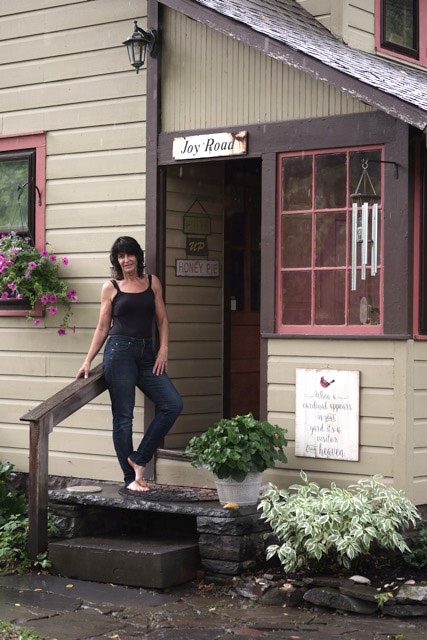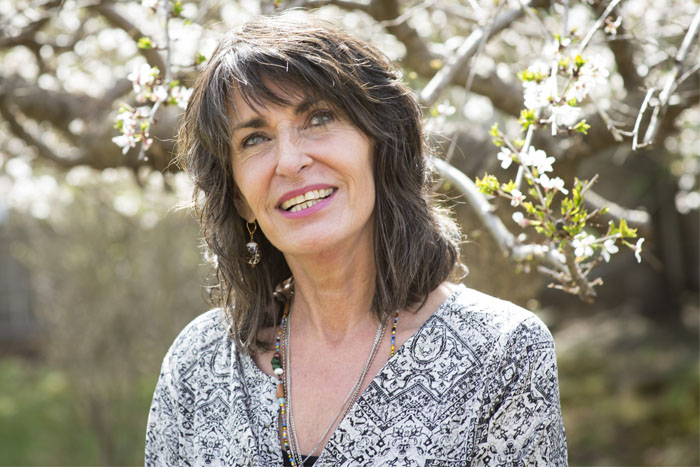

Julie Evans: From Addiction to Recovery
A conversation with Joan Herman
Throughout life we go on different journeys. Some bring us to wonderful destinations, while others teach valuable life lessons. The coming-of-age story of Julie Evans has it all: sex, drugs, a harrowing fall from grace, and a heartening turnaround. As a teen, Julie lost her mother to alcohol poisoning and father to cancer. A series of choices left her addicted to sex, nicotine, alcohol and cocaine. Julie made the decision to turn her life around and today she works to help people transform their wellness into a way of life.
Interview on Woodstock Book Talk
Julie Evans' Joy Road: My Journey from Addiction to Recovery is an entry in the growing library of memoirs covering an individual's path through the hell of substance abuse and out again, but limiting the text to such a narrow slot is a disservice. More than anything else, Joy Road is a book about self-discovery and coming to terms with one's self. We could excise any mention of mind-altering substances from the author's life and still be left with a gripping account of what it means to survive the slings and arrows of outrageous fortune. Evans did not find peace in easy answers or on some Tibetan mountaintop; gurus and spiritual experiences are part of her story but, ultimately, I believe Evans discovered inner peace by, at last, coming to terms with herself, her past, and discovering the true freedom that forgiveness and selflessness provide.
 Make no mistake, however — drugs do play an enormous role in this book. Evans deals in forthright language with her childhood and the pain losing both parents early in life dealt her, but her story first digs in and gains traction in the early 1970.s, the twilight of Vietnam, post Altamont when the promise of the hippie generation openly crumbled unraveled from LSD and marijuana powered expansion of consciousness into narcotics, violence, and wrecked lives.
Make no mistake, however — drugs do play an enormous role in this book. Evans deals in forthright language with her childhood and the pain losing both parents early in life dealt her, but her story first digs in and gains traction in the early 1970.s, the twilight of Vietnam, post Altamont when the promise of the hippie generation openly crumbled unraveled from LSD and marijuana powered expansion of consciousness into narcotics, violence, and wrecked lives.
The contrast of the idyllic and base could not be more stark; she flees a IV drug using boyfriend for the seemingly bucolic hippie utopia of the Florida Keys only to have it ends in murder and dissolution, jettisons her life there hoping to find something in New Orleans, a Big Easy far removed from the phantasmagorical acid trips of Easy Rider, returns back to Minnesota in an attempt to regain her bearings, and so on. She packs more life experience into a decade than many pack into five and shares it with readers through lean prose that eschews sideshows or self-indulgent reveries.
Her experiences turn grim with the introduction of cocaine into her life. It is that time in American history; the white powder that began flooding into American life during the 1970.s turned into a virtual tsunami of snow with the dawning of the 1980's and, like many others, Evans lost herself for a time in the same blizzard. Her emergence from those years can be ascribed to many factors; Evans never hesitates to credit the care and she experienced from many along the way but the narrative, intentionally or not, makes clear that her inner resolve to persevere is what pulled her through above all else.
There is a life force within her glowing through the book's passages that's impossible to deny or ignore. This is a book that many will find valuable and inspiring; you don.t need to be an addict or a recovering addict to glean something from these pages. Julie Evans. Joy Road: My Journey from Addiction to Recovery is an exquisite work testifying to the enduring power of what it means to be human and only the hardest of hearts will fail to be moved by her experiences.
 Julie Evans arrived in Woodstock after an already tumultuous life. The year was 1981, and she had just left the back of a galloping horse that was about to jump over a parked car in Central Park.
Julie Evans arrived in Woodstock after an already tumultuous life. The year was 1981, and she had just left the back of a galloping horse that was about to jump over a parked car in Central Park.
Evans was an accomplished equestrian, an open-jumper who'd just offered to teach a friend to ride. But her horse was a high-strung newcomer to New York City, a racehorse new to retirement and to New York City. The horse was having none of what the city typically offers its first-time visitors. He bolted.
"He just got the better of the bit," Evans recalled last week. "He was jumping kids, he was jumping baby strollers..."
And when the horse made for the car, on his way to the Central Park stables, Evans "just let go." She hit the turf, hard. The horse made it over the car. After her forced landing, a cabbie came by to tell her he'd clocked their escapade.
"He was all excited, said we'd done 47 miles an hour," Evans recalled with a characteristic smile and an eye roll. "I broke my coccyx."
That was her ticket to Woodstock. Evans wound up recuperating in a bare-bones cabin on Meads Mountain Road, courtesy of a wealthy — and very weird — benefactor. She's been a Woodstocker ever since.
The incident could serve as a perfect microcosm of Evans's life: intent on helping someone, things get seriously out of hand, and one seeming disaster leads to unforeseen rescue and rebirth. It's the sort of life that makes for compelling — sometimes breathtaking — reading. In other words, her story, newly captured in memoir form, is not only a personal ride on the wild side, it's also a quintessentially Woodstockian tale of adventures — spiritual and otherwise — reached for, grabbed, lost and regained.
The title of her memoir, Joy Road: How I Quit Smoking and Found the Lord, doesn't do her story justice, making it sound like an invitation to a Christian coffee klatsch. Evans has been able to quit much more than cigarettes in a her lifetime, and her discovery of the Lord came late enough in life — and quietly enough — to allow her stories to resonate with more familiar experiences. She pulls no punches, provides plenty of surprises and writes with a refreshing matter-of-factness.
Evans grew up in Rochester, Minnesota, a fact she views as perfectly emblematic of the life she wanted to lead. Rochester is home to the Mayo Clinic, one of the country's oldest and most famous hospitals.
"It's a place of healing. I knew from the beginning that's what I wanted to do — to heal."
She and her best friend used to play in the hospital's underground passages, a network made necessary by the city's famously frigid winters. She felt completely at home there.
When she got older, she became a nurse's aide at Masonic University of Minnesota, where she helped cancer patients cope with the difficulties of chemo therapy with marijuana and massage therapy.
But her plans ran aground before she hit the age of 20. She rebounded from a disastrous early marriage by falling in with a strange bunch of drop-outs in Key West with an aversion to clothing. People with names like Fu Moon and Mexican Joe and Dreaming Eagle. Her days there will ring bells for any readers who remember being twenty-something in a land of naive promise, endless hopefulness and eventual disenchantment.
But disenchantment never lasted long enough to keep Evans from embarking on radically new and nearly unbelievable adventures. She found a soulmate in a woman she calls Tanya, whose talent for marketing (herself and her various endeavors) remains legendary to all who know her real identity. When Evans decided to escape life in the Keys, the two young women did so in a way that nearly-though-not-quite culminated in a book: they biked up the coast to Manhattan, where they pedaled their tale to any number of news outlets before the pair were off onto another jaw-dropping adventure.
Those adventures are memorably documented in the book and can't be sufficiently or succinctly summarized here. They included a life that spun dizzily around drugs and dancing and living the high life and the low, of watching enviously as and sadly as her friendship with Tanya dissolved in a mix of misunderstandings and heartache. "She was the mighty oak and I was the funky wooden swing hanging from one of her branches."
Evans's tales of life in late '70s New York City barely takes the reader mid-way through the book. It doesn't include the ill-advised but head-long plunges into relationships that went quickly south, the wild-side scenes of a drug-addled "friends," of cocaine eyes gone blind, of rat-infested apartments In Alphabet City where "despair hung in the air like humidity."
Read those chapters and understand, if there could possibly be any doubt, why Woodstock would take such strong and powerful and welcome hold on Evans. And understand why she can smile today when she says she had to break her back to get there, because Woodstock was where she finally found her road to joy.